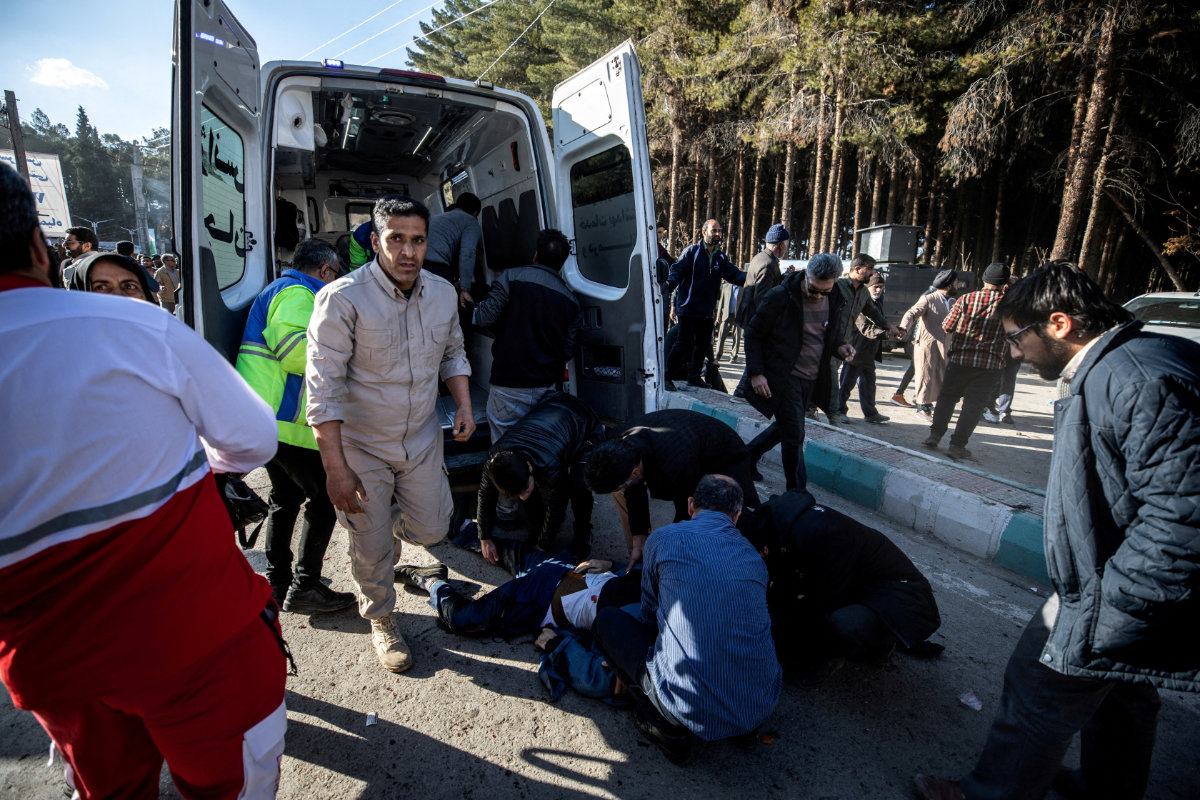TEHRAN: Daesh said Thursday that it carried out twin bombings which killed at least 84 people at a memorial ceremony in Iran for slain Revolutionary Guards general Qasem Soleimani.
The claim from Daesh came as Iran observed a day of national mourning for those killed in Wednesday’s blasts.
In a statement on Telegram, Daesh said two of its members “activated their explosives vests” among the crowds who had come to honor Soleimani on the anniversary of his death in a targeted US drone strike in Baghdad four years ago.
Iranian investigators had already confirmed that the first blast at least was the work of a “suicide bomber” and believed the trigger for the second was “very probably another suicide bomber,” the official IRNA news agency reported earlier, citing an “informed source.”
Soleimani, who headed the Guards’ foreign operations arm the Quds Force, was a staunch enemy of Daesh, a Sunni extremist group which has carried out previous attacks in majority-Shiite Iran.
The death toll was revised down from around 100 the day after what Iranian authorities labelled a “terrorist attack” that also wounded hundreds near Soleimani’s tomb in the southern city of Kerman.
Iran has suffered deadly attacks in the past from jihadists and other militants as well as targeted killings of officials and nuclear scientists blamed on arch foe Israel.
On Thursday, Interior Minister Ahmad Vahidi spoke to ISNA news agency about bolstering security over its porous borders with Afghanistan and Pakistan.
He said authorities have identified “priority points to block along the border” with the two countries, which has long been a key access point for militant groups, drug smugglers and irregular migrants.
Iran’s supreme leader Ayatollah Ali Khamenei on Wednesday blamed “evil and criminal enemies” of the Islamic republic, without naming them, and vowed a “harsh response.”
Regional tensions have surged amid the Gaza war sparked when Palestinian militant group Hamas launched their deadly October 7 attack on Israel, which Tehran welcomed while denying any involvement.
President Ebrahim Raisi’s deputy chief of staff for political affairs, Mohammad Jamshidi, charged on social media platform X that “the responsibility for this crime lies with the US and Zionist (Israeli) regimes, and terrorism is just a tool.”
The United States rejected any suggestion that it or its ally Israel were behind the bombings, while Israel declined to comment.
“The United States was not involved in any way, and any suggestion to the contrary is ridiculous,” said State Department spokesman Matthew Miller.
“We have no reason to believe that Israel was involved in this explosion,” he added, expressing sympathies to the victims of the “horrific” explosions and their families.

People injured in two explosions that struck a crowd marking the anniversary of the 2020 killing of Guards general Qasem Soleimani, are helped outside a hospital in the southern Iranian city of Kerman on January 3, 2024. (AFP/File)
Regional tensions have surged since the Gaza war erupted, drawing in Iran-backed armed groups in Lebanon, Iraq, Syria and Yemen.
Hamas fighters infiltrated Israel on October 7, killing around 1,140 people, most of them civilians, according to an AFP tally based on official Israeli figures.
In response, Israel launched a relentless offensive that has reduced vast swathes of Gaza to rubble and killed more than 22,300 people, according to the health ministry in the Hamas-run territory.
Iranian authorities called for mass protests again the Kerman blasts after weekly prayers on Friday, when officials have said those killed will be laid to rest.
Revising down the death toll, Interior Minister Ahmad Vahidi told IRNA “the number of martyrs... has been announced as 84 so far.”
Iran’s emergency services chief Jafar Miadfar pointed to difficulties identifying dismembered bodies and said some victims were mistakenly counted “several times.”
He said 284 people were wounded and “195 are still hospitalized.”
Revered by many Iranians, Soleimani oversaw Iranian military operations across the Middle East, and millions came to his funeral in 2020.
Current Quds Force commander Esmail Qaani suggested the Kerman crowd was “attacked by bloodthirsty people supplied by the United States and the Zionist regime.”
He pointed to two recent killings widely blamed on Israel — a Beirut strike on Hamas deputy leader Saleh Al-Aruri, and the killing near Damascus of senior Guards commander Razi Moussavi in December.
“The killing of Aruri and people like Razi Moussavi and the crime in Kerman show how desperate the enemy is,” Qaani said.
Iran regularly accuses its arch foes Israel and the United States of inciting unrest, and authorities last month executed five people convicted of collaborating with Israel.
In July, Iran’s intelligence ministry said it had disbanded a network “linked to Israel’s spy organization” that it said had been plotting “terrorist operations” across Iran.
In September, the Fars news agency reported that an Daesh-affiliated key “operative,” in charge of carrying out “terrorist operations,” had been arrested in Kerman.





























